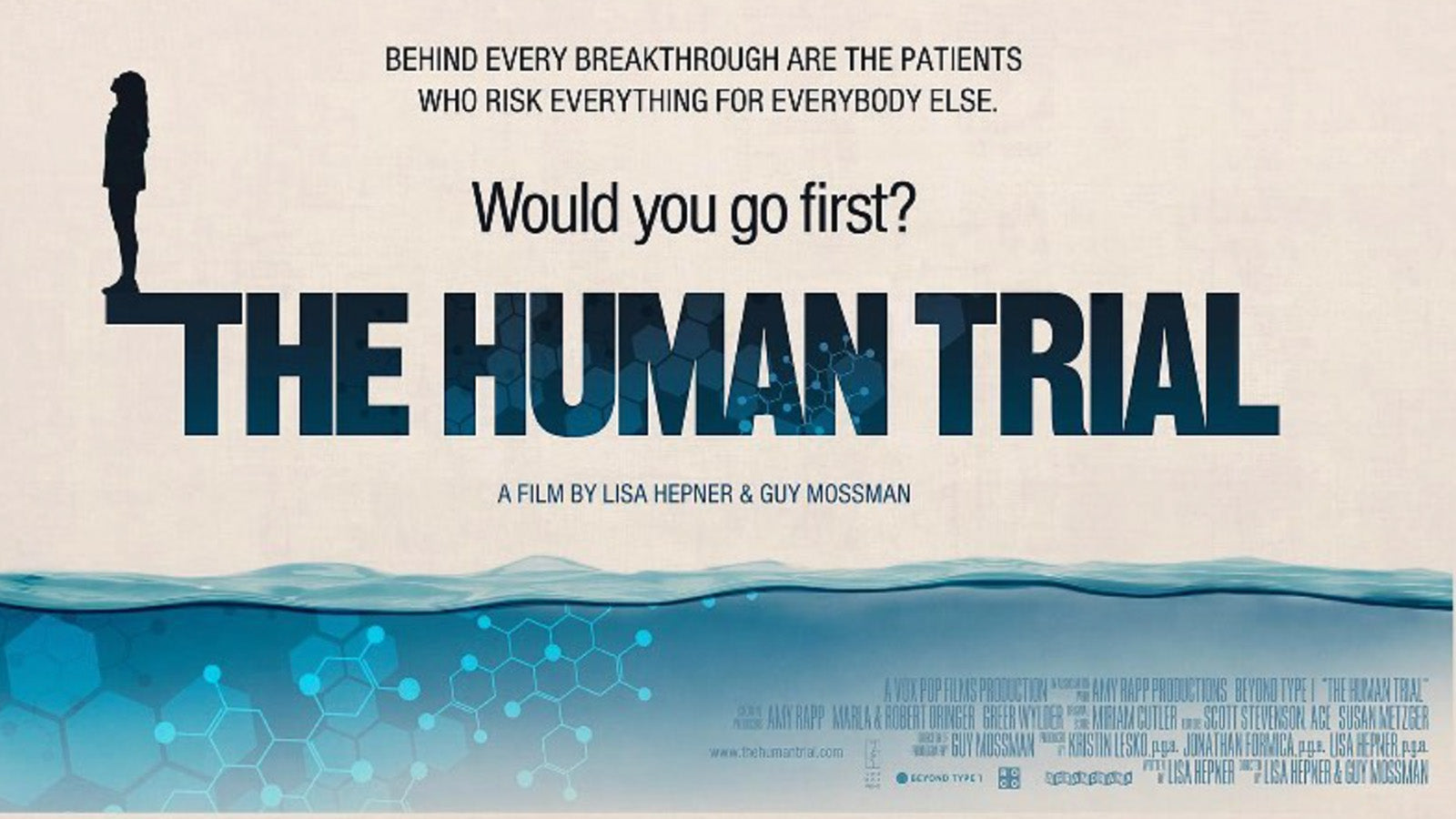
| Blogs and publications on this website are independent of any involvement by medtech companies or diabetes related charities. To ensure there is no bias, we do not accept any products, freebies or other material from any medtech provider. All materials are copyright©️Love My Libre Ltd. |
***
🎬 Film Review
Libre Life Rating
Following a clinical trial using stem cells towards a ‘cure’ for type 1 diabetes
https://www.thehumantrial.com Available in the UK on Apple via iTunes (paid)
***
The Human Trial film has attracted much interest in the diabetes community and received considerable support from the charity, JDRF, and non-profit organisation, Beyond Type 1, who were involved in the making of the film. It has also been acclaimed by critics and received several notable awards in the film industry.
Although released in the US in June 2022 with many other countries following in November, it has only been possible to see The Human Trial in the UK since 20th December 2022 and access is limited to Apple TV+ costing £5.49 to rent for 48 hours.
I would say this is quite expensive for a one-off viewing of 91-minutes and this blog sets out to give you an insight into the film, without you needing to pay the price.
***

Essentially, The Human Trial is a documentary. The film is written, directed and produced by Lisa Hepner (with her husband, Guy Mossman), a type 1 who started out seeking the answer to “Why is the cure always 5 years away”. It’s a running ‘joke’ amongst PWD. Personally I wonder if only those newly diagnosed put any faith into this claim, as it’s been around for so long.
Early on in the film Lisa refers to a common frustration experienced by type 1s. “ I look healthy, but I’m not!” I expect many PWD will relate to that.
The film’s narrative is based on following two patients with type 1 diabetes who agree to be the first humans to trial a new method of ‘growing stem cells’ implanted in the body; specifically 10 pods are surgically inserted into their lower arm and hip area (note, showing the sites is a slightly squeamish moment). The hope is that the cells wil evolve and be able to produce insulin, based on a method that’s shown success in rats.
***

“If it works it’s like winning the lottery!”
Being part of a clinical trial is not something I have personally considered but, the film demonstrates that it is not a decision to be taken lightly. The emotional rollercoaster of diabetes management comes across strongly, with the trial putting additional burden on the participants, Maren and Greg.
There’s lots of self-questioning and wondering if the trial is working for them as they have no direct contact with the company carrying out the trial — all contact is through the medical team at Minnesota University.
***
There are quite a few heavy hitting facts presented in the film, such as that over 500 people die each year from diabetes (in the US) and statements such as ‘the pancreas is the ugliest organ in the body’ which I’d never considered but which I interpreted as painting a negative picture of the condition.

Reality
The Human Trial doesn’t shy away from the emotions of being on a clinical trial or having type 1 diabetes.
The film acurately portrays the reality of living with the condition and covers lots of important ground that type 1s will be aware of. It could certainly help with raising awareness for those new to the condition or with little direct knowledge of the impact of diagnosis. I particularly felt the relevance of this comment describing a hypo:
“You can feel your body shutting down and you’ve got to do something about that.”
And, there’s also reference to the familiar feeling of constantly trying to understand, ‘why me?’ and ‘why is my glucose level too high/too low/this number?’.
It’s easy to feel empathy for patient 1, Maren, who has a difficult time with the trial as the cells don’t appear to be ‘working’ in her body and after leaving the trial she has a pancreas transplant which also doesn’t work for her.
Funding
Several very important themes emerge from the film which I hadn’t really considered before. Mainly around issues of running a research business and the relationship with other medtech companies and the absolute importance of funding described as
“ mastering selling risk to venture capitalists“.
Despite the donations from charities, which are an important part of funding research, the amounts are a small ‘drop in the ocean’ and researchers need to work with existing large medtech companies as well as other investors.
 The film shows the contrasting highs of receiving funding and lows when they only have enough cash for another 180 days. The company executives are shown pitching for funding in Saudi Arabia (where they have one of the highest rates of type 1 diabetes in the world) and Japan. It is a constant stuggle as investors typically want evidence that the trials will work, but the proof won’t exist without the funding in the first place.
The film shows the contrasting highs of receiving funding and lows when they only have enough cash for another 180 days. The company executives are shown pitching for funding in Saudi Arabia (where they have one of the highest rates of type 1 diabetes in the world) and Japan. It is a constant stuggle as investors typically want evidence that the trials will work, but the proof won’t exist without the funding in the first place.We learn that the average cost of developing a new drug is in the region of $3billion and typically takes 10–20 years to go through research and trials before submission to the FDA, and hopefully approval. In the USA there’s also the approval of insurance companies before a drug or treatment may reach the end patient — all of which adds to time and costs.
I found it surprising how small the company (ViaCyte) felt they were in the medtech industry; talk of running out money and $150million being small-fry for a medtech corporation.
The detachment between the researchers and patients was also surprising.
Insulin costs
In one scene we see Greg, patient 2, going through his bills and invoices, underlying the issue that insulin has now become one of the most expensive liquids on earth!
This is despite the fact that the discoverers (Banting, Best, Collip and Macleod) sold the patent to the University of Toronto for a symbolic $1 in 1922 and Banting declaring:
“Insulin does not belong to me, it belongs to the world.”
It’s now a $245 billion industry!

The Human Trial gives a quick recap of the discovery of insulin and a visit to Banting House in Canada, the home of Frederick Banting. The Flame of Hope at the front of the House is a beacon to stay ignited until a cure for type 1 diabetes is found.
Film’s Conclusion
The Human Trial certainly pulls on the heart strings and if you too have type 1 diabetes then a part of you is likely to be watching with a hope from within yourself that the researchers will deliver what they set out to — in their own words — “to transform patient hope into reality”. They show a strong belief that they are doing the right thing towards a ‘cure’ and that this is better than any medtech — perhaps their main competitor in terms of funding.
I don’t think I’m spoiling the film to say that it doesn’t work for the first 2 PWD, but as the film covers a time period of nearly 10 years, there is hope further down the line and Greg reflects that he’s:
“been a part of something beneficial to us, all of us with diabetes”.
By the end of the film, the updated information for 2021 is that transplanted stem cells are producing insulin in 9 patients.
The future
The upshot of the film is that from a medical stance Viacyte (the biotech startup featured) attained proof-of-concept with favourable safety and efficacy data.

The business has since been acquired by a larger medtech business, Vertexand the next stage in development is already underway which involves working with CRISPR to get the cells to be accepted by the body without patients needing anti-rejection drugs for life.
It’s already been more than 10 years, but progress towards that ‘cure’ appears to have been made and research is ongoing in 2023.
Libre Life’s View
Apart from the obvious appeal to type 1s, I’m not really sure who the film is aimed at. It is eye-opening, emotional and authentically portrays the real-life of patients dealing with day-to-day living with type 1 diabetes.
However, I do feel that although there is hope that a ‘cure’ will come from stem cell development, there is also a very ‘grey’ feel to the film which I read as depressing and unfulfilling.
Many type 1s are able to live fairly ‘normal’ lives and use their condition in a positive way. The limits that were previously placed on those with diabetes, even just 5 or 10 years ago, have become far fewer and the use of medtech such as FreeStyle Libre and Dexcom CGM has certainly contributed to diabetes itself becoming an enabling force for giving some PWD a sense of purpose.
With this in mind, here’s to the next 5 years and the hope that the elusive becomes reality.
*****
Other recommended films
Non-fiction with diabetes-related content
The Diabetes Solution on Amazon Prime (paid)
Fiction with diabetes-related content
Purple Hearts see our review here.
Turning Red see our review here.
Links
The Human Trial https://www.thehumantrial.com
💛💛💛
Disclaimer
Content here and on our website www.lovemylibre.com does not constitute medical advice or replace the relationship between you and healthcare professionals nor the advice you receive from them.
The author of this blog has type 1 diabetes and uses the FreeStyle Libre 2 which is provided on NHS prescription. We do not have any affiliate relationship with Abbott FreeStyle Libre or any medtech provider. All trademarks are the intellectual property of their respective owners.






Sarah Wardell
January 29, 2023
I have T1 & have had for 46 years, I use a freestyle libre 2. I have not yet watched the film but am very interested for this media to reach as many individuals as possible.